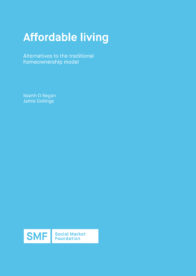High house prices are putting homeownership out of reach for many, but rising rents and insecurity of tenure make the private rental sector an undesirable long-term option. This report – the fourth in our series on the problem of housing – looks at the role social and cooperative housing can play and what the UK can learn from other countries.
KEY POINTS
- Falling homeownership rates and dissatisfaction with private renting mean there is a role for social housing and co-operative housing to play in tackling the housing crisis.
- The UK has a relatively large social housing stock, but it has been dwindling since the 1980s, contributing to rising waiting lists.
- 17% of UK households rent socially, behind only Denmark, Austria and the Netherlands in the OECD, but far lower than the 31% who rented socially in 1980.
- 2 million families are waiting for social housing – 4% of the population and 25% of the social housing stock.
- Co-operative housing offers tenants greater security of tenure and lower rents than the private sector, but the UK makes less use of housing co-operatives than other Anglosphere countries, and far less than Scandinavia.
- Co-ops make up only 0.2% of the UK’s housing stock, compared to 0.6% in Canada, 0.3% in Ireland, and 23% in Sweden.
- UK makes less use of housing cooperatives than elsewhere in the Anglosphere, and much less than elsewhere in the world
- But cooperative housing requires residents to be involved in running the co-op, and require government support to overcome challenges relating to their legal status, finance and funding, education and finding land.
KEY RECOMMENDATIONS
- To support the growth of social housing, the government should:
- Put in place long-term funding plans and commit to substantial capital investment to establish a revolving funding model, and end the right to buy.
- Local authorities should ensure their planning processes encourage social housing development.
- To stimulate the growth of co-operative housing, the government should:
- Give social and private tenants a ‘collective right to buy’, with priority over other bidders.
- Establish a Co-operative Housing Lender backed by a state guarantee and able to borrow on bond markets to issue loans to co-operative housing projects.
- Build a national database of land suitable for community-led development and give community groups first right of refusal on publicly owned land.
- Expand the network of community housing support hubs and improve the public’s understanding of co-operatives.

DOWNLOAD THE REPORT PDF
Kindly funded by

